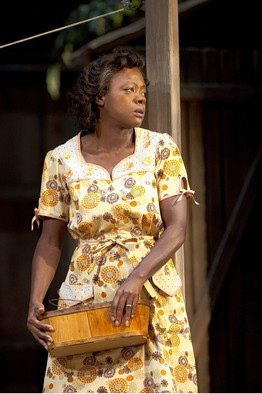In today’s Wall Street Journal drama column, I cover the opening of the Broadway revival of August Wilson’s Fences, a great American play in which Viola Davis is giving the performance of a lifetime. I also have a few things to say about Enron. Here’s an excerpt.
* * *
 Denzel Washington is by far the biggest name associated with the first Broadway revival of August Wilson’s “Fences,” but my guess is that it’s Viola Davis whose performance is going to stick with you. Not that Mr Washington is anything less than solid, but Ms. Davis is something else again. I knew she was a remarkable artist–anyone who saw her in the Off-Broadway premiere of Lynn Nottage’s “Intimate Apparel” or the film version of John Patrick Shanley’s “Doubt” knows that–but what she’s doing this time around goes straight into my scrapbook of stage performances from which you learn how brutally true to life great acting can be….
Denzel Washington is by far the biggest name associated with the first Broadway revival of August Wilson’s “Fences,” but my guess is that it’s Viola Davis whose performance is going to stick with you. Not that Mr Washington is anything less than solid, but Ms. Davis is something else again. I knew she was a remarkable artist–anyone who saw her in the Off-Broadway premiere of Lynn Nottage’s “Intimate Apparel” or the film version of John Patrick Shanley’s “Doubt” knows that–but what she’s doing this time around goes straight into my scrapbook of stage performances from which you learn how brutally true to life great acting can be….
It was Wilson’s special achievement to forge the everyday speech of working-class blacks into a language poetic enough to encompass tragedy. Time and again in “Fences” the actors utter sentences so pointed that they make you want to laugh out loud with delight: “I told him if he wasn’t the marrying kind, then move out the way so the marrying kind could find me.” “The only thing I knew was the time had come for me to leave my daddy’s house. And right there the world suddenly got big.”
Ms. Davis speaks her share of these sentences with relish, but she also makes us see their meaning. When Mr. Washington confesses that he has betrayed her, she appears to shrink before your eyes. “You telling your wife this?” she cries. “I have to wait 18 years to hear something like this?” Then her arms flail at random, as if she were a puppet whose strings had been clipped by despair….
Can good topical theater be spun out of nine-year-old news? Maybe, but you won’t prove it by Lucy Prebble’s “Enron,” a ripped-from-the-headlines black comedy about the rise and fall of the corporation whose 2001 collapse sent shivers through the world of finance that are felt to this day. Rupert Goold’s ultra-flashy production abounds with high-tech stage trickery, none of which manages to conceal the thinness and triviality of Ms. Prebble’s surprisingly unamusing script….
* * *
Read the whole thing here.
Terry Teachout on the arts in New York City
An ArtsJournal Blog
